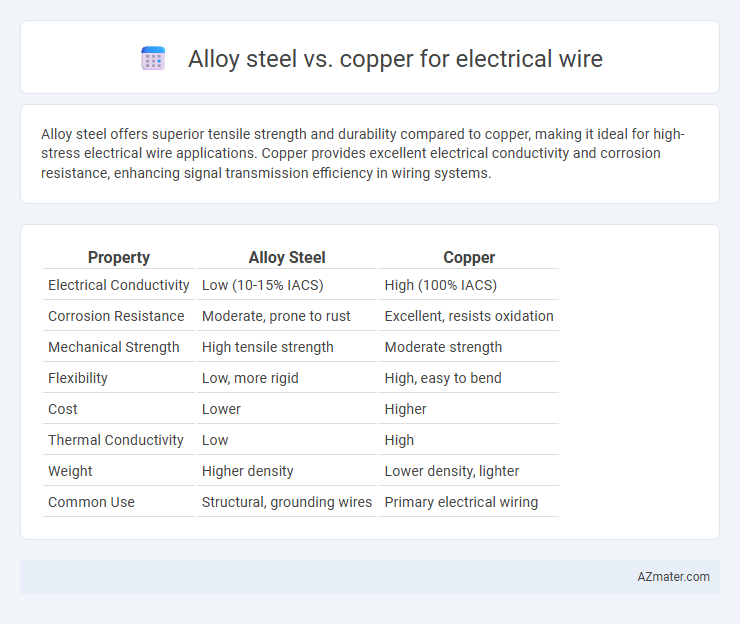Alloy steel offers superior tensile strength and durability compared to copper, making it ideal for high-stress electrical wire applications. Copper provides excellent electrical conductivity and corrosion resistance, enhancing signal transmission efficiency in wiring systems.
Table of Comparison
| Property | Alloy Steel | Copper |
|---|---|---|
| Electrical Conductivity | Low (10-15% IACS) | High (100% IACS) |
| Corrosion Resistance | Moderate, prone to rust | Excellent, resists oxidation |
| Mechanical Strength | High tensile strength | Moderate strength |
| Flexibility | Low, more rigid | High, easy to bend |
| Cost | Lower | Higher |
| Thermal Conductivity | Low | High |
| Weight | Higher density | Lower density, lighter |
| Common Use | Structural, grounding wires | Primary electrical wiring |
Overview of Alloy Steel and Copper as Electrical Conductors
Alloy steel, known for its strength and durability, exhibits moderate electrical conductivity but is generally less conductive than copper, making it less ideal for electrical wiring where high conductivity is crucial. Copper, with its superior electrical conductivity (approximately 5.96 x 10^7 S/m at 20degC) and excellent corrosion resistance, remains the preferred choice for electrical conductors, ensuring efficient current flow and minimal energy loss. The mechanical robustness of alloy steel offers benefits in specific structural applications, but copper's balance of conductivity and malleability makes it optimal for standard electrical wire use.
Electrical Conductivity Comparison: Alloy Steel vs Copper
Copper exhibits significantly higher electrical conductivity, approximately 97% IACS (International Annealed Copper Standard), making it the preferred material for electrical wiring due to efficient current flow and minimal energy loss. In contrast, alloy steel typically demonstrates much lower conductivity, around 2-15% IACS, depending on its composition, leading to higher resistive losses and reduced electrical performance. This substantial difference makes copper the dominant choice in applications demanding superior electrical conductivity and reliability.
Mechanical Strength and Durability Factors
Alloy steel offers superior mechanical strength compared to copper, making it more resistant to physical stress and deformation in electrical wire applications. Copper, while highly conductive, is softer and more prone to wear and fatigue under mechanical strain. In terms of durability, alloy steel wires excel in harsh environments due to their high tensile strength and corrosion resistance, whereas copper wires require protective coatings to maintain long-term performance.
Corrosion Resistance in Electrical Applications
Alloy steel offers moderate corrosion resistance in electrical applications but can be prone to rust and oxidation without protective coatings. Copper excels in corrosion resistance due to its natural oxide layer, which prevents further degradation and ensures long-term conductivity. This makes copper the preferred choice for electrical wiring where durability and minimal signal loss are critical.
Thermal Conductivity and Heat Dissipation
Copper exhibits significantly higher thermal conductivity, approximately 400 W/m*K, compared to alloy steel, which ranges between 15-50 W/m*K depending on the composition. This superior thermal conductivity allows copper wires to dissipate heat more efficiently, reducing the risk of overheating during high current loads and enhancing electrical performance. Alloy steel's lower heat dissipation capacity often necessitates additional cooling measures and limits its suitability for high-performance electrical wiring applications.
Cost Analysis: Alloy Steel vs Copper Wiring
Alloy steel wiring offers a cost-effective alternative to copper with significantly lower raw material and production expenses, making it suitable for budget-sensitive electrical projects. Copper wire, despite its higher upfront cost, provides superior electrical conductivity and corrosion resistance, reducing long-term maintenance and replacement costs. Evaluating total lifecycle expenses, alloy steel may reduce initial investment, but copper's durability and efficiency often result in better cost savings over time.
Weight and Flexibility Considerations
Alloy steel wires generally offer higher tensile strength and durability but are significantly heavier and less flexible compared to copper wires, making them less suitable for applications requiring ease of installation and bending. Copper wires provide excellent electrical conductivity while maintaining lightweight properties and superior flexibility, which is crucial for handling tight bends and frequent movement in electrical wiring systems. Weight reduction and enhanced flexibility in copper contribute to improved efficiency and reliability in electrical installations where malleability is essential.
Common Applications for Each Material
Alloy steel electrical wires are commonly used in grounding applications and overhead power lines due to their high tensile strength and durability. Copper wires are extensively utilized in residential and commercial electrical wiring, telecommunications, and electronic circuitry thanks to their excellent electrical conductivity and corrosion resistance. Both materials serve critical roles in electrical infrastructure, with alloy steel favored for mechanical strength and copper preferred for efficient electrical transmission.
Safety and Reliability in Electrical Systems
Alloy steel and copper differ significantly in electrical wire applications, with copper offering superior conductivity and corrosion resistance, enhancing safety and reliability in electrical systems. Alloy steel, while stronger and more durable mechanically, has higher resistance leading to greater heat generation and potential safety risks under high current loads. Copper's excellent conductivity reduces energy loss and overheating, making it the preferred choice for safe and reliable electrical wiring in residential and industrial settings.
Environmental Impact and Sustainability
Alloy steel, commonly used for electrical wires, offers durability and recyclability, contributing to a lower environmental impact through reduced material waste and energy consumption during production. Copper, while highly conductive and widely recycled, has significant environmental concerns due to intensive mining processes that result in habitat destruction and high energy use. Sustainable practices favor using recycled copper or advanced alloy steel compositions that minimize ecological footprints in electrical wiring applications.

Infographic: Alloy steel vs Copper for Electrical wire
 azmater.com
azmater.com